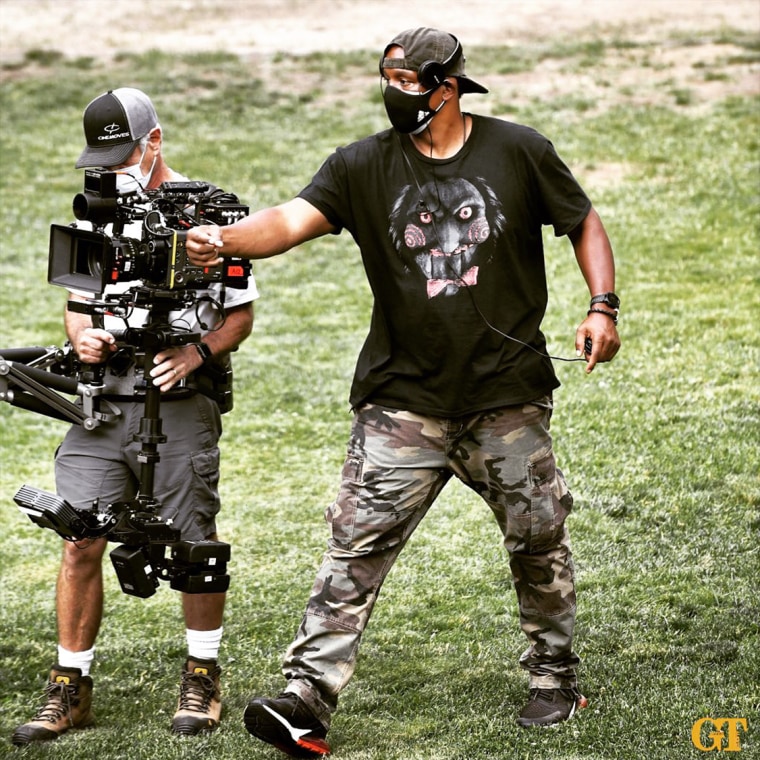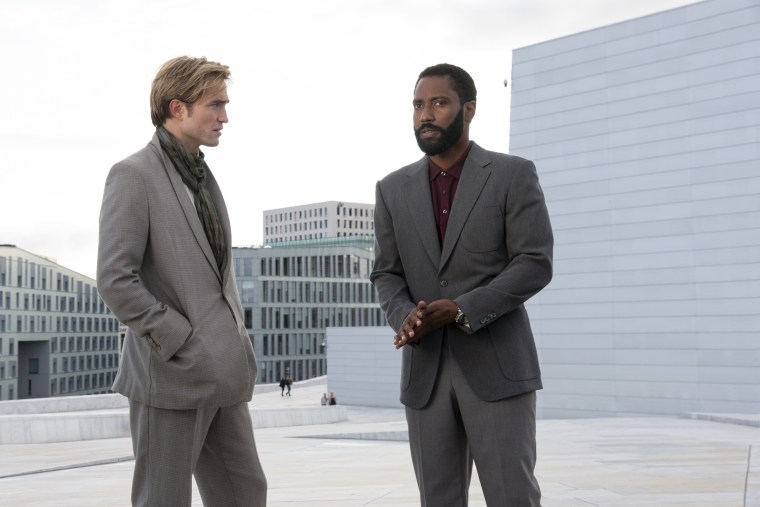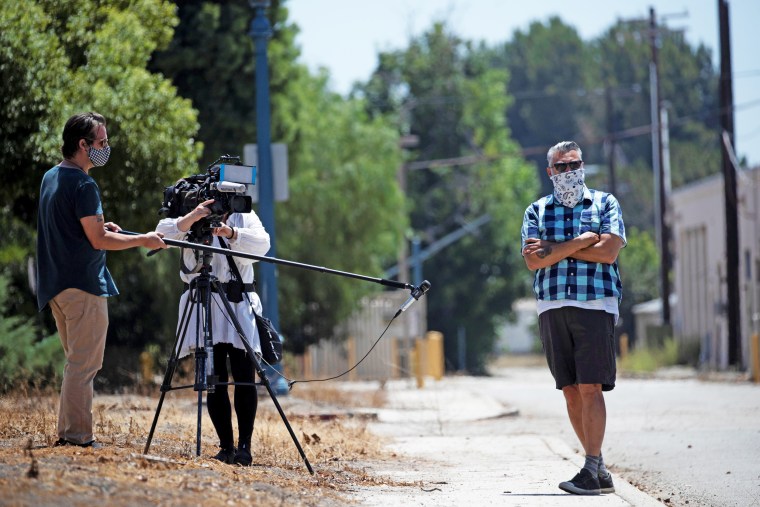After his most recent finished movie — "Fatale," a thriller starring two-time Oscar winner Hilary Swank — got pushed back from its June release date to October with movie theaters shuttered across much of the U.S., director Deon Taylor set out to write a script that channels the current zeitgeist.
Writing is one thing. To actually shoot his horror movie, "Don't Fear," the story of a band of friends who shelter in the mountains to survive during the coronavirus pandemic, Taylor had to go beyond method acting and actually shelter in place with his cast and crew.
"We wanted to actively define the moment, not let the moment define us," Taylor said. "So after learning a bit about how you mask, how you social distance, how this thing actually works, we decided to be one of the first people in the world to actually go back and do a film."
Making "Don't Fear" provided plenty of drama at a time when film production in much of the world is only now carefully getting back underway after months in limbo because of COVID-19.

Before cameras could start rolling in the mountains near Lake Tahoe, Taylor and his wife and producing partner, Roxanne, needed to consult health experts and develop a COVID-19 protocol plan acceptable to the state of California as well as all the major film guilds in the beginning of July.
The set, they learned, would have to be a "bubble" in which the 70 cast and crew members quarantined from the outside world during shooting. Everyone would get daily temperature checks and frequent COVID-19 tests. While on set, the mandate was to social distance and wear masks as much as possible.
"It's all very awkward," Taylor said. "But it's just, you know, this is the new normal. We're figuring it out."
There's a lot to figure out across the entire film business. An industry that prizes creativity, however, is coming up with innovative ways to adapt.
In the last six months, almost every facet of Hollywood from production through exhibition has ground to a halt, an economic setback unprecedented in cinematic history. This is a business, after all, for which social distancing is a more alien concept than something out of a sci-fi flick — think of the crowded sets on big-budget blockbusters to the packed movie theaters where those movies are screened.
All that changed abruptly in mid-March.
"It wasn't a fade to black, it was a snap to black," said Colleen Bell, executive director of the California Film Commission.
New reality comes into focus
Even as COVID-19 cases tick up in California, television and film production is slowly restarting, avoiding another such "snap" even though California Gov. Gavin Newsom ordered a second lockdown on July 13. This time around, people in the industry are considered essential workers.
California can't afford the alternative: Bell says the industry supports more than 700,000 jobs that account for $16 billion in wages in the state.
A task force dubbed the Industry-Wide Labor-Management Safety Committee formed by the studios and major film unions consulted medical experts to produce a 22-page white paper submitted in June on the protocols productions would need to proceed safely.
"COVID is going to be with us a while, so we really felt the need to open up, with a focus on safety," Bell said.
The other two major film and TV production hubs in the U.S., New York and Georgia, are also back up and running — despite a surge of cases in the latter. In New York City, the one-time global epicenter of the virus, commercial work and independent productions have resumed under strict safety guidelines. Still, larger productions such as NBC's "Law & Order" are not expected to resume shooting until the fall.
Filming restarted weeks ago elsewhere in the world, including New Zealand, where the virus has been contained.
At Pinewood Studios near London, cameras started rolling again on "Jurassic World: Dominion," the latest installment in Universal's action franchise, on July 6. (Universal Pictures and NBC News both belong to the same parent company, Comcast.)
The cast and crew, including stars Chris Pratt and Bryce Dallas Howard, were told to adapt to a new status quo — lest the film would go the way of the dinosaurs.
In practical terms that meant all personnel working in the bubble had to quarantine for 14 days if they flew in from the United States, per British health protocols. They had to wear masks on the sets at all times, with the actors set for a scene wearing face shields to smear the makeup, a source close to the production told NBC News. The shields come off shortly before director Colin Trevorrow yells, "Action"; they go back on shortly after, "Cut." Lighting is set up before the actors arrive for the scene.
Access to the lot inside the bubble was restricted first by temperature checks and second by color-coded wrist bands that separate crew members who had to be on set during filming from those who did not, like construction and rigging, said the source, who requested anonymity because they were not authorized to speak publicly.
"You do as much as you can before you actually bring in the actors, which gives you the ability to create a small bubble around them on the set," the source said. "We're certainly much smaller than we would have normally been if it wasn't COVID."
Typically, the source added, "on a 'Jurassic' movie, we would have had 250 people on set. Now, it's about half of that."
Included in that smaller crew: Medical professionals to monitor for potential outbreaks.
A reel problem
Even when potential blockbusters like "Jurassic Park: Dominion" are wrapped, it may be a while before an audience sees them.
Bans on indoor gathering across the country are grim news for moviemakers hoping their films actually garner an audience. Only 20.8 percent of theaters — in real terms, 1,255 of 6,021 — were open across the U.S. and Canada as of July 31, according to Comscore, a media-tracking firm.
With your local Regal or AMC shuttered, it's been a boon for streaming services: Netflix added 10 million paid subscribers in the second quarter this year, an increase of 27.3 percent in year-to-year numbers, bringing the company's viewership to 193 million worldwide, according to its latest investors report. Disney announced this week that it passed 60 million paid subscribers for its Disney+ service in just nine months of operation.
The same studio is debuting its live-action remake of "Mulan" on the streaming service for $29.99 — bypassing theaters entirely. In late July, Universal and AMC Theatres, the nation's largest cinema chain, announced a deal allowing the studio's movies to be made available on video on demand just 17 days after release on the big screen. Traditionally, the window has been 90 days.
Those are huge blows for exhibitors whose entire business model relies on the appeal of seeing these films first on the big screen.
"This complete shutdown has never happened before in the history of entertainment," actor Morgan Freeman told NBC News in May. "Shut-ins are currently bingeing on Amazon, Netflix, Hulu and whomever else is streaming. Habits may be forced to change."
"Who knows?"
The 83-year-old Oscar winner says he remembers the vivid terror he felt seeing his first movie in a theater, the original "King Kong" as a 6-year-old.
There is terror of a different kind for moviegoers presented with the reality of sitting in an enclosed theater for two hours in the summer of 2020. Even when theaters reopen in New York and L.A., the biggest markets in the country, social distancing requirements and the cost of frequent disinfecting are going to seriously cut into the take unless theaters raise ticket prices significantly.
Some films are just meant for the theater. Director Christopher Nolan certainly intended his next big-budget thriller, "Tenet," for the big screen, but Warner Bros. has been forced to change the release date five times, most recently to Aug. 26 internationally and a week later in the U.S. That date may still be wishful one — no one can say if theaters in major markets will be open by then. "Tenet," starring John David Washington as an espionage agent trying to solve a mystery that could save the world, is a tentpole movie that has been pegged as the industry's big hope for a triumphant return to normalcy.

"It’s going to be like grading on a curve, lest anyone think that opening weekends can match the same expectations," said Paul Dergarabedian, senior box office analyst for Comscore. "There is no road map, there is no blueprint, there was no plan for this. This was a set of circumstances that has taken the rule book shredded it and thrown it out the window — and everyone understands that."
As bad as the situation is for the big studios, the coronavirus pandemic has been an even bigger disaster for arthouse and international cinema. The prestigious Cannes and Telluride film festivals, slated for May and September respectively, were canceled, denying many independent filmmakers the opportunity to screen their work and find distributors. The selection committees for both film festivals, however, unveiled the films that made the festival cut in a bid to honor and publicize those titles.
The 58th annual New York Film Festival will go on in September with one major plot twist. Adhering to the state's social distancing guidelines, the festival is partnering with Rooftop Films, which has two drive-in theaters in the city. In other words, some films will be en plein air and others will stream online.
"We currently don't have access to any of our theaters in Lincoln Center," said Eugene Hernandez, director of the New York Film Festival. "So we've reimagined the festival. We're hewing closely to the mission of the festival — bringing international cinema to New York — but the how and when will be unlike it's ever been before in the history of the festival."
"In order to be responsible and safe and careful and keep our audience's well-being at the forefront," Hernandez said, "we will take place outdoors in the open air in New York City this fall."
As COVID-19 continues to cut a swath across the country, however, the future looks more like improv than scripted. The real test of all these safety protocols will be when positive cases pop up on a major set. Suspense, though, is not enjoyable when you're making a thriller.
"Look, the reality is we're all risking our lives to make this film right now," said Taylor, thinking on his tightly choreographed, ongoing film shoot near Lake Tahoe. "Every night we sit in the car and we go home and we go, 'Man, did I do it right, I hope no one's infected, I hope I'm not infected. I hope I didn't do something silly and take the mask off in the wrong area.' That's serious, man."
"I'm doing it because I love the art," Taylor said. "I'm driven not to let this moment in time make me believe I could not do it."
